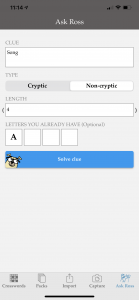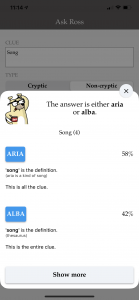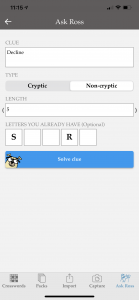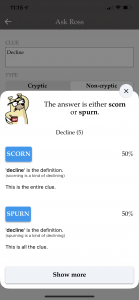Frequently Asked Questions
These are questions we have previously encountered about Crossword Genius. Please contact if there are further questions you want answered.
How do I rename a crossword after scanning it?
To change the name or add/change the description:
- Open the scanned crossword
- Click the (i) icon in the top right hand corner.
- Click "About this crossword"
- Then click the "Edit" button
From the resulting dialog, the name can be changed and a description added or changed.
How can I delete badly scanned or other crosswords?
To delete scanned crosswords, on the main Crosswords screen:
- Click "See All" next to Recent Crosswords
- Click Edit in the top right hand corner of the screen
- click the red (-) sign next to the crossword you wish to delete
- click the red Delete that then appears
- Confirm you wish to delete (deleted crosswords cannot be restored)
- Click Done when you are finished deleting crosswords
To delete crosswords from the Library, swipe left and then click Delete.
How can I improve results from the Scan feature?
To get the best results for scanning crosswords the photo should:
- be taken in good light
- the image should tightly include the grid and all the cryptic clues
- it should be free from shadow (sometimes shadow over part of the image can stop the grid being located)
- the image can be landscape or portrait (Ross will figure it out) - but try to get the image as square as possible
Other tips:
- if Ross reports the quality is low, try again and keep trying. Ross can usually use your previous attempts to do better with the second or later image you take.
- Please do edit the clues when you see that Ross has made small errors in the transcription. In addition to making the experience better for this crossword, Ross can learn from your edits to improve accuracy in future scans.
Can I scan crosswords that have been published on the web?
Although we didn't design the feature to support this and results are very mixed, some customers have had some success using the scan feature to scan in crosswords they have printed, photographed off a computer screen - or even from a screenshot containing the grid and clues.
The version 2 Import feature is designed to address this. Importing crosswords via a share from Safari, when it works is more accurate that trying to understand an image so is the recommended method.
Does Crossword Genius support linked clues?
Linked clues are clues in a crossword where the answer is written in more than one place in the crossword. Typically the clue in the newspaper will start with something look like "5 & 11 down: " and 11 down will say something like "See 5 across"
Crossword Genius does support such clues. If the scan feature fails to do this properly edit the clue to start with the piece that gives the additional clue numbers starting with an '&' and ending with a colon (':'). e.g. for the above example edit the clue to start "& 11 down: ..." - the app will take care of the rest. A variety of different syntax is supported - if multiple lights are used you can use commas e.g. start the clue with ", 5 across, 11 & 13 down: ". Just the clue number can be used if it isn't ambiguous.
What clue syntax is supported?
The general principle for the syntax of clues is that the cryptic clues should look as close as possible to how they appear in printed crosswords.
i.e. Entering the clue exactly as it appears on the printed page should work.
The one novel bit of syntax that we use is the optional use of an asterisk (‘*’) in length descriptions. e.g.
Belief that won't change on reflection (5*)
says that although the total number of letters in the answer is 5, the number of words is unspecified. Without the asterisk it would say that the answer is a single word. This allows basic support for American crosswords and others where the only knowledge is the number of characters in the grid.
We support a wide variety of different length descriptions. These can appear at the end of the clues in the crossword - or in the length part of Ask Ross (without having to enter the brackets).
Examples:
(9) says that the answer is a single word of nine letters.
(15*) the answer is fifteen letters long and composed of one or more words.
(9, 3 words) says that the answer is nine letters long and composed of three words, where the word breaks are not specified. This syntax is found in some of the harder (usually barred) crosswords.
(9, three words) is exactly like the above.
(8, hyphenated) says that the answer is eight letters long and composed of two words with a hyphen between them. The relative length of the two words isn’t specified.
(4,5) says that the answer is made up of two words, the first four letters long and the second five letters long.
(3,4,2,3) e.g. The Land of Nod
(4-5) like the above but the words have a hyphen between them.
(5-3,5) e.g. match-box label
When solving Ross is less strict about matching words. For example there is almost no general agreement about hyphenation with many dictionaries contradicting each other. For this reason Ross will suggest answers of the required number of words and total length even his opinion of the hyphenation is different from that specified in the clue.
Can Ross solve non-cryptic crosswords too?
Crossword Genius is primarily aimed at cryptic crosswords. With version 2 however, there is now some early support for British-style non-cryptic crosswords.
For American style crosswords there is currently far less support and you will find that answers are frequently not words or phrases Ross has seen before and he won't know the cultural references. American clues also don't specify the word breakdown. To specify that the number of words is unknown, put an asterisk after the number of letters in the length description.
For longer, general knowledge style clues, Ross can be of some help but you should lower your expectations a lot in terms of how accurate the software will be without help from you. Ross is simply not designed to answer general knowledge questions.
However, with some rephrasing of the clue, and using "Ask Ross", you can often get the right answer. The kind of straight clue the software does well with are things like "type of dog", "part of car", "animal", "girl's name" etc. i.e. something short which might be the definition part of a cryptic clue.
The key to making it work is for you to simplify the long natural language clue into something shorter that will include the right answer. For example, the clue:
This is commonly performed in an opera house (4)
checked letters: A???
can be simplified to:
Song (4)
checked letters: A???
(what else would be performed in an opera house?) at which point the software will give you the answer ARIA


Another example would be the clue:
Habitual idlers .... any job that entails hard work. (5)
checked letters: S??R?
(Taken from a Malaysian prize puzzle.) The software is not going to do a good job with the clue in that format but you can use your intelligence to realise that the answer is going mean something similar to the word "decline". You know this because the position of the missing word in the sentence implies a verb and from the logic of the workshy declining jobs that require hard work. Thus if you rephrase the clue to simply:
decline (5)
checked letters: S??R?
and you will get the two possible answers SPURN and SCORN both of which could be correct answers to the original clue.
Screenshots below:


Is Crossword Genius free?
Crossword Genius is free to download. You will never be charged for using Crossword Genius unless you sign up for a subscription to unlock special features or purchase additional material within the app.
How do I cancel a Crossword Genius subscription?
These instructions on Apple's website show you how to cancel your subscription.
Where did Ross get his name?
The name Ross is a cryptic crossword joke. Ross is an....
Artificial Intelligence who is really into crosswords (4)
